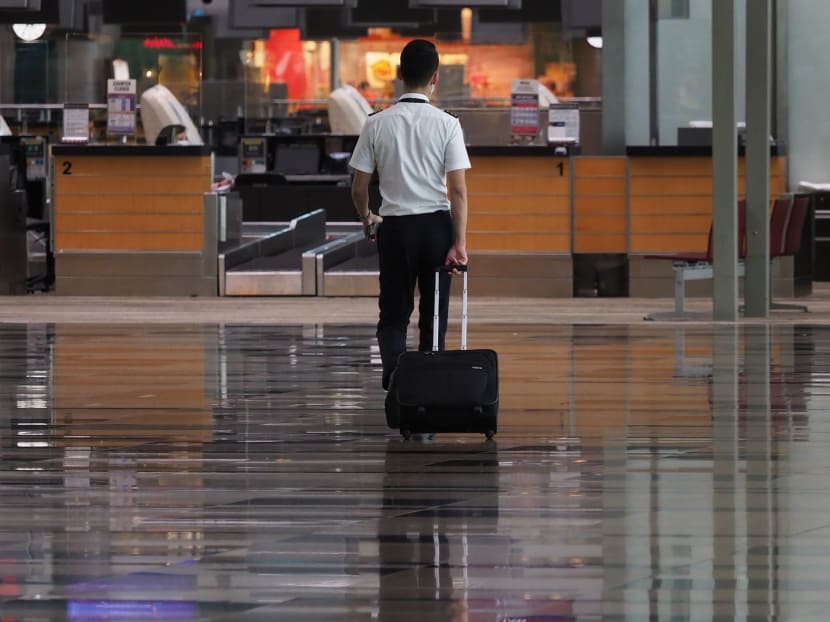One sees his flying dream cut short, other SIA pilots become delivery drivers, retire early
SINGAPORE — It was his life-long dream to be a pilot but for Steven, his career was over before it even began.
- One cadet pilot will have to leave SIA after three-quarters of his training stint
- Some pilots have taken on delivery jobs to make up for lost income
- Some foreign pilots are returning to their native countries
- One pilot is studying part-time, while another has taken loans to keep his children in school
- A senior pilot is retiring earlier so that the younger ones can continue
SINGAPORE — It was his life-long dream to be a pilot but for Steven, his career was over before it even began.
He is among the cadet pilots from the Singapore Airlines (SIA) Group who will have to leave the company after completing his third of four phases of training, which lasts about three to four months.
Steven, who declined to reveal his real name, spent five years in a corporate role before making a career switch to pursue his dream of flying.
“I tried to get into the Air Force before and after National Service because I always had this curiosity and passion for flying. But at the time, they had strict rules about wearing spectacles and so I was never eligible,” he said.
He only embarked on the idea after a friend of his had become a pilot for the airline and he learned more about what the role entailed.
Still, he never thought his stint would end this way.
Singapore’s national carrier announced on Sept 19 that its pilots would be taking 10 to 60 per cent pay cuts, weeks after revealing that it would be retrenching about 2,400 workers across SIA, SilkAir and Scoot.
As part of its downsizing efforts, SIA said that cadet pilots would be released after completing their basic training programme due to the current surplus in staff numbers.
The company, however, said that it would be open to hiring them should the demand for air travel return to pre-Covid levels.
It is a hope that Steven still clings on to.
“Things are also very uncertain because you don't know when the callback will be and it could happen in three to four years' time after most of us might have found other jobs. But at the same time, because it's a lifelong dream, I think most of us would quit our jobs and return to flying,” he said.
He is open to trying out new jobs or returning to his previous industry.
TODAY spoke to 12 pilots, some of whom have been retrenched, while there are those who have taken on delivery jobs to make up for lost income.
There are also the older ones who have opted for early retirement.
TAKING ON DELIVERY JOBS
One pilot has worked as a delivery driver for Lalamove, GOGOX and Ryde since March, after the number of flights he operates was reduced from six to eight a month, to only once a month. The last time he flew was in April.
“My basic pay was not sufficient to cover my monthly expenses and still save. Now, I’m able to get by more comfortably,” said Brian, who declined to reveal his real name. The S$2,000 to S$3,000 he earns from doing deliveries help pay for his insurance, housing payments and car loans, said Brian who is in his 20s.
He is also grateful that he has gotten into the groove of making these deliveries, which are busiest on weekends, now that the additional pay cuts have been announced.
“I’m lucky I don’t have to scramble to get started on another job or to get used to doing the deliveries,” he said.
While some pilots TODAY spoke to have undertaken jobs such as safe distancing ambassadors, Brian decided on doing deliveries for its flexibility. He said he is not the only pilot who has turned to doing deliveries.
In response to TODAY’s queries, the Air Line Pilots Association – Singapore (ALPA-S) said some pilots have had to take up secondary jobs to supplement their income, especially those with children.
“SIA has been supporting us by sourcing for and providing secondary job offerings on our internal platform for their employees,” the union representing pilots in Singapore said.
“ALPA-S is also working with different agencies to assist our pilots in looking for alternate job employments to supplement their loss of income during this trying time.”
RETRENCHED, AND GOING HOME
One Filipino, who has been living in Singapore for the past nine years with his wife and two of his four children, will return to the Philippines.
The 53-year-old pilot is one of the over 50 pilots under the SIA Group — whom TODAY understands are all Employment Pass (EP) holders — who received the news of their retrenchments on Sept 14.
He has a son in Secondary 1 who has lived in Singapore since the age of four, and he will have to adapt to a whole new education system when he returns to his home country.
“He's most anxious about going back home. He will find himself a foreigner in his own country,” said the Filipino who declined to be named.
As for himself, he said: “Right now, I’m very worried. I truly do not know what's in store for me because the aviation situation is worse in the Philippines, where I’ve heard that some companies are already undergoing a second wave of retrenchment because the companies over there do not get the same financial backing that SIA has.”
He has been flying for 29 years.
Another retrenched pilot, a Malaysian national in his mid-40s who has been flying with SIA for just over 20 years, is also heading home.
He, too, declined to be named.
“Flying is my forte. It’s all I’ve ever done. Stepping into the unknown, especially at this age, with a lack of experience in other areas, is quite scary,” he said, adding that he will return to Malaysia in three weeks to avoid further racking up his expenses here.
He now regrets not having tried to obtain Singapore citizenship or permanent residency.
“We are the first ones to go perhaps because we are not Singaporeans or permanent residents. Perhaps (with a citizenship) I could have just delayed my retrenchment... but it’s completely my fault,” he said.
BORROWED MONEY TO KEEP CHILDREN IN SCHOOL
For one pilot, having to take a pay cut has forced him to resort to borrowing money to keep his children in overseas universities. He is also trying to sell his car.
The 50-year-old pilot who declined to be named has been with the airline for 27 years. He told TODAY that he is cash-strapped because the money he has earned during the span of his career has been invested in properties, stocks and bonds.
On average, he used to earn S$23,000 a month compared with S$13,000 these days.
“My monthly expenses add up to over S$19,000 a month and it’s not the right time to give up my stocks and bonds and sell my properties because I’ll get nothing. I’ll get a second job, I’ll sell my clothes if I have to,” he said.
For pilot Terence Soon, 30, on the other hand, he said that the pay cuts have not really affected him or brought worry upon his family, despite having a five-month-old daughter to care for.
Mr Soon, who ran as a Progress Singapore Party candidate in Tanjong Pagar Group Representation Constituency in the 2020 General Election and has been with the airline for almost five years, said that his expenses are very low.
“My mentor has always told me that you've got to treat your salary like you're just taking (your) basic (salary). Don't ever count your allowances because you never know there would be a day when suddenly there’s no more flights and you have to survive on your basic pay,” he said.
“So, the amount that I spend per month is really rather low and I try to be consciously aware of that, because how many things could I possibly need?”
Mr Soon is in the midst of applying for other full-time jobs.
A 28-year-old pilot, who wanted to be known only as CJ, said that even with the pay cuts, he is grateful for the amount he makes and “couldn’t ask for more”. He has been flying with the airline for four years.
In pre-Covid times, he would make about S$14,000 a month on average, including allowances. After the pay cut, his basic salary is S$6,460, reduced from S$7,600.
“I don't think I can make a salary even comparable or equivalent to what we’re drawing right now in any other job. So I think the company's being really nice,” he said.
He will begin a part-time Master of Business Administration programme at the National University of Singapore in January.
TIME FOR YOUNGER ONES TO SHINE
A 59-year-old pilot who has been with the airline for 27 years said he is retiring early to help his younger Singaporean colleagues continue on in their jobs.
“I'm already 59 and, looking at the situation, it’s not going to improve drastically in the next two or three years,” he said.
“Right now, the younger colleagues are coming up and they haven't seen the world. They have not even got anywhere close to what we’ve (older pilots) got,” added the pilot who also declined to be named.
The retirement age for SIA pilots is 62. Pilots can be re-employed beyond the age of 62 on a contract basis until the age of 65.
“I think even if I have to downgrade to a smaller house, it's not a big problem,” he said.
“Most importantly, we are making space for the younger pilots to continue because they have many more years to go and families that need their support.”












